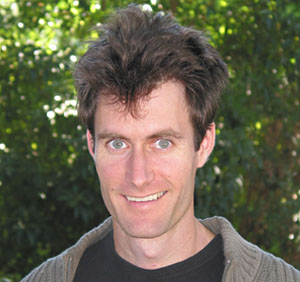
Dr. Gregory Laughlin
Assistant Professor of Astronomy and Astrophysics
Office: 279 Interdisciplinary Sciences
Phone: 831-459-3208
Email: laughlin@ucolick.org
Educational Background:
- B.A. Physics, University of Illinois
- Ph.D. Astronomy, University of California, Santa Cruz
Research Interests:
Greg Laughlin's research interests are in theoretical astrophysics, with an emphasis
on numerical simulations. Current areas of investigation include:
- The dynamics of extrasolar planets: Over seventy extrasolar planets
have been detected, and more systems are being detected every month. By studying
the long-term orbital evolution of the new systems, we can gain insight into
their formation, and thus obtain a better understanding of how our own solar
system fits into the galaxy's inventory of planets. Other projects include
an ongoing observational search for planets around high metallicity stars
(in collaboration with Debra Fischer and Geoff Marcy at UC Berkeley), and
the coordination of a detection network for transiting extrasolar planets
(see http://www.transitsearch.org/)
- The hydrodynamics of self-gravitating disks: This work is mainly geared toward
understanding the growth and saturation of spiral density waves in protoplanetary
disks. Spiral instabilities are a key mechanism for eliciting the transport
of angular momentum through nascent planetary systems, and thus are very important
to an overall understanding of planet formation.
- Stellar evolution: Research topics in this area include the luminosity functions
of white dwarfs and low mass stars, the metallicity distribution of stars in
the solar neighborhood, the evolution of low mass red giants, and the stellar
evolutionary consequences of the giant planet -- stellar metallicity connection.
- The long-term evolution of the Universe: In a collaboration with Fred Adams
of the University of Michigan, we are studying processes which unfold over timescales
greatly exceeding the Hubble Time. These include galactic evolution, the effects
of proton decay, and processes involving black holes.
laughlin@ucolick.org
